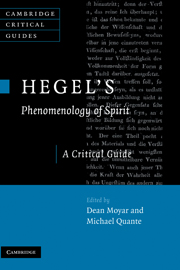Book contents
- Frontmatter
- Contents
- Notes on the contributors
- Preface
- List of abbreviations and citations
- Chapter 1 Substance, subject, system: the justification of science in Hegel's Phenomenology of Spirit
- Chapter 2 “Science of the phenomenology of spirit”: Hegel's program and its implementation
- Chapter 3 The Phenomenology of Spirit as a “transcendentalistic” argument for a monistic ontology
- Chapter 4 Sense-certainty and the “this-such”
- Chapter 5 From desire to recognition: Hegel's account of human sociality
- Chapter 6 “Reason … apprehended irrationally”: Hegel's critique of Observing Reason
- Chapter 7 What is a “shape of spirit”?
- Chapter 8 Ethical life, morality, and the role of spirit in the Phenomenology of Spirit
- Chapter 9 Self-completing alienation: Hegel's argument for transparent conditions of free agency
- Chapter 10 Practical reason and spirit in Hegel's Phenomenology of spirit
- Chapter 11 Religion and demythologization in Hegel's Phenomenology of Spirit
- Chapter 12 The “logic of experience” as “absolute knowledge” in Hegel's Phenomenology of Spirit
- Bibliography
- Index
Chapter 9 - Self-completing alienation: Hegel's argument for transparent conditions of free agency
Published online by Cambridge University Press: 22 September 2009
- Frontmatter
- Contents
- Notes on the contributors
- Preface
- List of abbreviations and citations
- Chapter 1 Substance, subject, system: the justification of science in Hegel's Phenomenology of Spirit
- Chapter 2 “Science of the phenomenology of spirit”: Hegel's program and its implementation
- Chapter 3 The Phenomenology of Spirit as a “transcendentalistic” argument for a monistic ontology
- Chapter 4 Sense-certainty and the “this-such”
- Chapter 5 From desire to recognition: Hegel's account of human sociality
- Chapter 6 “Reason … apprehended irrationally”: Hegel's critique of Observing Reason
- Chapter 7 What is a “shape of spirit”?
- Chapter 8 Ethical life, morality, and the role of spirit in the Phenomenology of Spirit
- Chapter 9 Self-completing alienation: Hegel's argument for transparent conditions of free agency
- Chapter 10 Practical reason and spirit in Hegel's Phenomenology of spirit
- Chapter 11 Religion and demythologization in Hegel's Phenomenology of Spirit
- Chapter 12 The “logic of experience” as “absolute knowledge” in Hegel's Phenomenology of Spirit
- Bibliography
- Index
Summary
Most people have a sense of what it is like to feel alienated. Yet alienation remains among the most elusive concepts in social and political theory. The range of the term in ordinary usage extends from simply referring to a vague feeling of discontent all the way to implying a Marxist conception of capitalist false consciousness. To be a philosophically productive concept, alienation cannot just refer to a merely subjective inner state over which the individual has sole authority. But “objective” theories are also problematic, for they assume a view of human nature, or full human potential, that any person can be alienated from (that would define true rather than false consciousness). An advantage of such an objective theory would be its ability to give quasi-verifiable criteria for predicating the “alienation” of an individual, given that individual's activities, desires, etc. Yet the phenomenon of alienation is ineliminably first-personal. Even if an objective theory could arrive at a “correct” view of human nature, it could not account for an essential dimension of alienation. What we need is a framework for thinking of alienation that avoids the pitfalls of purely internal and purely external conceptions. We need a view that treats individuals as bearers of propositional attitudes and as discrete persons standing in determinate relations to public norms. Such a framework is provided by the concept of intentional action. Actions take place in contexts common to many individuals and, qua intentional, they cannot be reduced to mere behavior.
- Type
- Chapter
- Information
- Hegel's Phenomenology of SpiritA Critical Guide, pp. 150 - 172Publisher: Cambridge University PressPrint publication year: 2008
- 6
- Cited by

